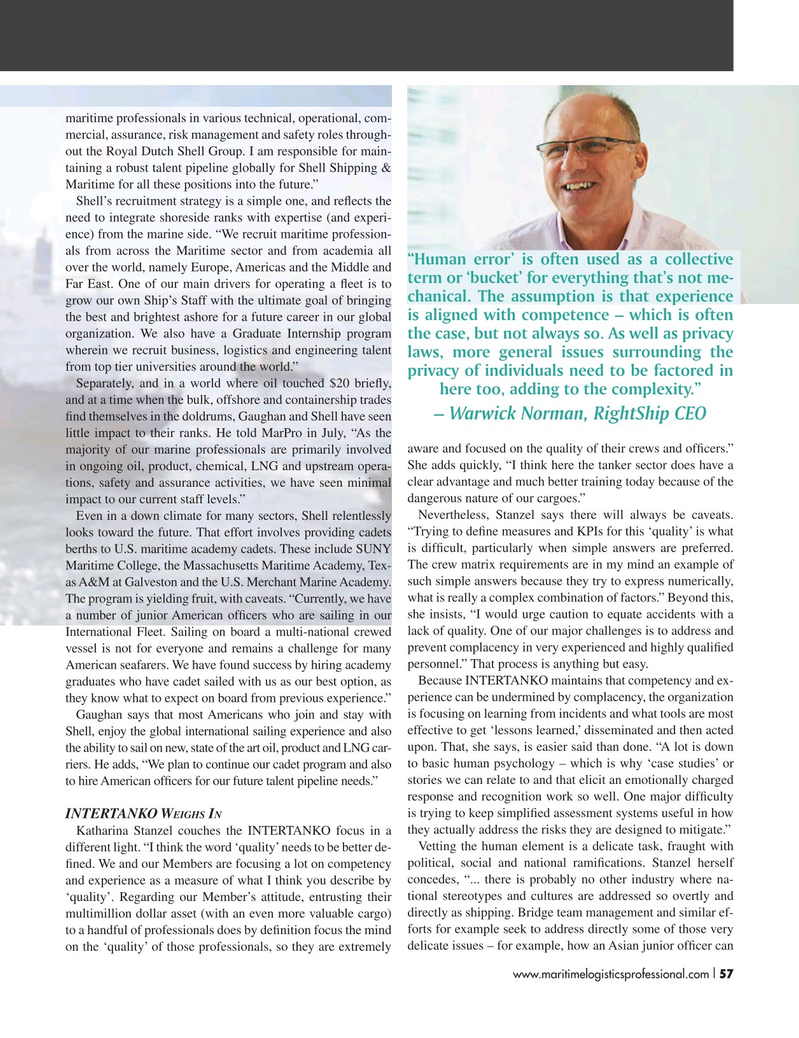
Page 57: of Maritime Logistics Professional Magazine (Q3 2016)
Shipbuilding, Repair & Maintenance
Read this page in Pdf, Flash or Html5 edition of Q3 2016 Maritime Logistics Professional Magazine
maritime professionals in various technical, operational, com- mercial, assurance, risk management and safety roles through- out the Royal Dutch Shell Group. I am responsible for main- taining a robust talent pipeline globally for Shell Shipping &
Maritime for all these positions into the future.”
Shell’s recruitment strategy is a simple one, and re? ects the need to integrate shoreside ranks with expertise (and experi- ence) from the marine side. “We recruit maritime profession- als from across the Maritime sector and from academia all “Human error’ is often used as a collective over the world, namely Europe, Americas and the Middle and term or ‘bucket’ for everything that’s not me-
Far East. One of our main drivers for operating a ? eet is to chanical. The assumption is that experience grow our own Ship’s Staff with the ultimate goal of bringing is aligned with competence – which is often the best and brightest ashore for a future career in our global organization. We also have a Graduate Internship program the case, but not always so. As well as privacy wherein we recruit business, logistics and engineering talent laws, more general issues surrounding the from top tier universities around the world.” privacy of individuals need to be factored in
Separately, and in a world where oil touched $20 brie? y, here too, adding to the complexity.” and at a time when the bulk, offshore and containership trades – Warwick Norman, RightShip CEO ? nd themselves in the doldrums, Gaughan and Shell have seen little impact to their ranks. He told MarPro in July, “As the majority of our marine professionals are primarily involved aware and focused on the quality of their crews and of? cers.” in ongoing oil, product, chemical, LNG and upstream opera- She adds quickly, “I think here the tanker sector does have a tions, safety and assurance activities, we have seen minimal clear advantage and much better training today because of the impact to our current staff levels.” dangerous nature of our cargoes.”
Even in a down climate for many sectors, Shell relentlessly Nevertheless, Stanzel says there will always be caveats. looks toward the future. That effort involves providing cadets “Trying to de? ne measures and KPIs for this ‘quality’ is what berths to U.S. maritime academy cadets. These include SUNY is dif? cult, particularly when simple answers are preferred.
Maritime College, the Massachusetts Maritime Academy, Tex- The crew matrix requirements are in my mind an example of as A&M at Galveston and the U.S. Merchant Marine Academy. such simple answers because they try to express numerically,
The program is yielding fruit, with caveats. “Currently, we have what is really a complex combination of factors.” Beyond this, a number of junior American of? cers who are sailing in our she insists, “I would urge caution to equate accidents with a
International Fleet. Sailing on board a multi-national crewed lack of quality. One of our major challenges is to address and vessel is not for everyone and remains a challenge for many prevent complacency in very experienced and highly quali? ed
American seafarers. We have found success by hiring academy personnel.” That process is anything but easy.
graduates who have cadet sailed with us as our best option, as Because INTERTANKO maintains that competency and ex- they know what to expect on board from previous experience.” perience can be undermined by complacency, the organization
Gaughan says that most Americans who join and stay with is focusing on learning from incidents and what tools are most
Shell, enjoy the global international sailing experience and also effective to get ‘lessons learned,’ disseminated and then acted the ability to sail on new, state of the art oil, product and LNG car- upon. That, she says, is easier said than done. “A lot is down riers. He adds, “We plan to continue our cadet program and also to basic human psychology – which is why ‘case studies’ or to hire American of? cers for our future talent pipeline needs.” stories we can relate to and that elicit an emotionally charged response and recognition work so well. One major dif? culty is trying to keep simpli? ed assessment systems useful in how
INTERTANKO W IEIGHS N
Katharina Stanzel couches the INTERTANKO focus in a they actually address the risks they are designed to mitigate.” different light. “I think the word ‘quality’ needs to be better de- Vetting the human element is a delicate task, fraught with ? ned. We and our Members are focusing a lot on competency political, social and national rami? cations. Stanzel herself and experience as a measure of what I think you describe by concedes, “... there is probably no other industry where na- ‘quality’. Regarding our Member’s attitude, entrusting their tional stereotypes and cultures are addressed so overtly and multimillion dollar asset (with an even more valuable cargo) directly as shipping. Bridge team management and similar ef- to a handful of professionals does by de? nition focus the mind forts for example seek to address directly some of those very on the ‘quality’ of those professionals, so they are extremely delicate issues – for example, how an Asian junior of? cer can www.maritimelogisticsprofessional.com 57I 50-63 Q3 MP2016.indd 57 8/17/2016 10:28:23 AM

 56
56

 58
58
